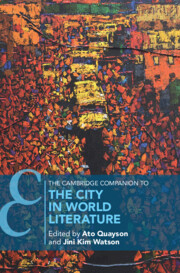Book contents
- The Cambridge Companion to the City in World Literature
- The Cambridge Companion to the City in World Literature
- Copyright page
- Contents
- Contributors
- Chronology of Political, Literary, and Cultural Events
- Chapter 1 Introduction
- Part I Critical Approaches
- Part II Spotlight Literary Cities
- Chapter 5 The Neighborhood and the Sweatshop
- Chapter 6 “The Whole World in Little”
- Chapter 7 Unworlding Paris
- Chapter 8 Sketching the City with Words
- Chapter 9 Romance and Liminal Space in the Twentieth-Century Cairo Novel
- Chapter 10 Bombay/Mumbai and its Multilingual Literary Pathways to the World
- Chapter 11 At Home in the World
- Chapter 12 Imagining the Migrant in Twenty-First Century Johannesburg
- Chapter 13 Russia
- Chapter 14 “Cityful Passing Away”
- Chapter 15 From Altepetl to Megacity
- Chapter 16 (In)Visible Beijing Within and Without World Literature
- Chapter 17 Worlding Lagos in the Long Twentieth Century
- Chapter 18 Haunted Vitality
- Select Bibliography
- Index
- Cambridge Companions To …
Chapter 18 - Haunted Vitality
Sydney, Colonial Modernity, and World Literature
from Part II - Spotlight Literary Cities
Published online by Cambridge University Press: 13 July 2023
- The Cambridge Companion to the City in World Literature
- The Cambridge Companion to the City in World Literature
- Copyright page
- Contents
- Contributors
- Chronology of Political, Literary, and Cultural Events
- Chapter 1 Introduction
- Part I Critical Approaches
- Part II Spotlight Literary Cities
- Chapter 5 The Neighborhood and the Sweatshop
- Chapter 6 “The Whole World in Little”
- Chapter 7 Unworlding Paris
- Chapter 8 Sketching the City with Words
- Chapter 9 Romance and Liminal Space in the Twentieth-Century Cairo Novel
- Chapter 10 Bombay/Mumbai and its Multilingual Literary Pathways to the World
- Chapter 11 At Home in the World
- Chapter 12 Imagining the Migrant in Twenty-First Century Johannesburg
- Chapter 13 Russia
- Chapter 14 “Cityful Passing Away”
- Chapter 15 From Altepetl to Megacity
- Chapter 16 (In)Visible Beijing Within and Without World Literature
- Chapter 17 Worlding Lagos in the Long Twentieth Century
- Chapter 18 Haunted Vitality
- Select Bibliography
- Index
- Cambridge Companions To …
Summary
‘Vitalities’ describes the creative-destructive energies of the globalised harbour city with its geographically sprawling, culturally diverse suburban mosaic. Yet as ground zero of British invasion in 1788, Sydney is also ‘haunted’. Dispossessive colonisation ghosts not only its colonial archive but can be glimpsed in the city’s landforms and topography. ‘Haunted vitalities’ recur in settler, sojourner and migrant writings that thematize Sydney Harbour’s vertical sublime and the city’s horizontal suburban sprawl. Working from the interwar period to the present, this chapter reads settler texts about Sydney alongside texts by First Nations people. Beyond interwar, harbour-centric works– Christina Stead’s Seven Poor Men of Sydney (1934), Kenneth Slessor’s elegiac poem ‘Five Bells’ (1939) and Eleanor Dark’s novel Waterway (1938)– the spatial frame is widened to Greater Metropolitan Sydney, moving from Eleanor Dark’s reimagining of British invasion in The Timeless Land (1941), to Ruby Langford Ginibi’s memoir Don’t Take Your Love to Town (1988) and Julie Janson’s novel Benevolence (2020). With Gail Jones’s Five Bells (2011), the chapter returns to the harbour to consider how this contemporary novel not only reckons with Sydney’s settler-colonial past through a world literary frame but also attends to the presence and voice of First Nations people.
Keywords
- Type
- Chapter
- Information
- The Cambridge Companion to the City in World Literature , pp. 279 - 294Publisher: Cambridge University PressPrint publication year: 2023



